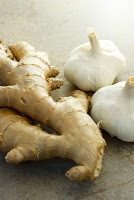Case Adams
Recent research has confirmed and quantified that whole extracts of Garlic and Ginger have the ability to stop several species of multi-drug resistant bacteria.
The newest research comes from Italy’s University of Pisa. The researchers tested garlic against the infective bacteria Staphylococcus aureus, Pseudomonas aeruginosa and Escherichia coli. The research found that all three bacteria species were inhibited by the Garlic extract, which was taken from fresh Garlic bulbs.
This research confirmed another recent study published in the Asian Pacific Journal of Tropical Biomedicine, and conducted by researchers from King Saud University and India’s Rangasamy College.
This study focused on seven of the most dangerous superbugs – called MDRs or multidrug resistant bacteria. These included E. coli, S. aureus, P. aeruginosa, Enterococcus faecalis, Klebsiella pneumoniae, Proteus mirabilis, Enterococcus cloacae and Bacillus subtilis.
The particular strains used in the study were some of the most multi-drug resistant strains known. Some of the bacteria strains tested against the Garlic and Ginger were resistant to more than 10 different antibiotics. These antibiotics included ampicillin, amoxicillin, amikacin, cephalothin, chloramphenicol, ciprofloxacin, ceftriaxone, clindamycin, co-trimoxazole, erythromycin, gentamycin, kanamycin, methicillin, novobiocin, nalidixic acid, norfloxacin, ofloxacin, penicillin, rifampicin, streptomycin, tetracyclin and vancomycin.
The researchers utilized whole Garlic and Ginger for the tests – ground with mortar and pestle. They utilized dimethyl sulphoxide as an extract medium. The researchers conducted repeated multiple laboratory tests using four different concentrations of the two herbal extracts, both separately and together.
 With the exception of Enterobacter sp. and Klebsiella sp., the researchers found that all of the bacteria tested were inhibited to some degree by the ginger and garlic. The bacteria inhibited the most by Ginger included P. aeruginosa, E. coli and Bacillus sp.
With the exception of Enterobacter sp. and Klebsiella sp., the researchers found that all of the bacteria tested were inhibited to some degree by the ginger and garlic. The bacteria inhibited the most by Ginger included P. aeruginosa, E. coli and Bacillus sp.
The Garlic extract inhibited P. aeruginosa the greatest, followed by E. coli and Bacillus sp. The Garlic cloves ethanol extract showed similar inhibition zones against Proteus sp., Enterobacter sp. and S. aureus.
The researchers added: “It is interesting to note that even crude extracts of these plants showed good activity against multidrug resistant strains where modern antibiotic therapy has limited effect.”
The research also indicated that the antibiotic potential of these two herbs was due to their combination of biochemicals – including their tannin, saponin, phenol, flavonoid and essential oil content.
Learn more strategies to increase immunity and combat infection.
The antibiotic effects of these two herbs have been supported by other studies, including one from researchers at India’s University of the Punjab. This study tested both Garlic and Ginger extracts against Escherichia coli, Pseudomonas aeruginosa, Bacillus subtilis, Staphylococcus aureus, Klebsiella pneumoniae, Shigella sonnei, Staphylococcusepidermidis and Salmonella typhi. While the inhibitory effect with Ginger was less, the Garlic extracts showed significant inhibitory activity against these bacteria – some of the most lethal infective species to humans.
 The two measurements used to quantify the ability of these herbs to inhibit the bacteria in these studies included Minimum Inhibitory Concentration (MIC) and Zone of Inhibition. The Minimum Inhibitory Concentration measures the concentration of a substance in solution that will inhibit the bacteria, and the Zone of Inhibition is the range of inhibition – typically measured in millimeters. These measurements are also used to quantify the ability of antibiotic drugs to inhibit bacteria. Lower MIC levels and greater inhibition zones equate to higher levels of antibiotic potential.
The two measurements used to quantify the ability of these herbs to inhibit the bacteria in these studies included Minimum Inhibitory Concentration (MIC) and Zone of Inhibition. The Minimum Inhibitory Concentration measures the concentration of a substance in solution that will inhibit the bacteria, and the Zone of Inhibition is the range of inhibition – typically measured in millimeters. These measurements are also used to quantify the ability of antibiotic drugs to inhibit bacteria. Lower MIC levels and greater inhibition zones equate to higher levels of antibiotic potential.
Both Garlic and Ginger have been used for centuries to combat infections of different types. The use of these herbs has crossed over many traditional medicines around the world as well.
References
- Casella S, Leonardi M, Melai B, Fratini F, Pistelli L. The role of diallyl sulfides and dipropyl sulfides in the in vitro antimicrobial activity of the essential oil of garlic, Allium sativum L., and Leek, Allium porrum L. Phytother Res. 2013 Mar;27(3):380-3.
- Karuppiah P, Rajaram S. Antibacterial effect of Allium sativum cloves and Zingiber officinale rhizomes against multiple-drug resistant clinical pathogens. Asian Pac J Trop Biomed. 2012 Aug;2(8):597-601.
- Gull I, Saeed M, Shaukat H, Aslam SM, Samra ZQ, Athar AM. Inhibitory effect of Allium sativum and Zingiber officinale extracts on clinically important drug resistant pathogenic bacteria. Ann Clin Microbiol Antimicrob. 2012 Apr 27;11:8.
Case Adams is a California Naturopath and holds a Ph.D. in Natural Health Sciences. His focus is upon science-based natural health solutions. He is the author of 25 books on natural health and numerous print and internet articles. His work can be found at http://www.caseadams.com.
This article first appeared at GreenMedInfo. Please visit to access their vast database of articles and the latest information in natural health.
linkwithin_text=’Related Articles:’



Be the first to comment on "Garlic and Ginger Inhibit Drug Resistant Bacteria"